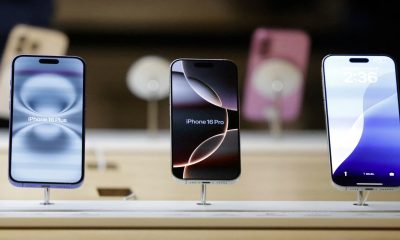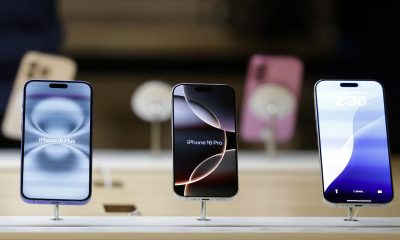Sci & Tech
Apple To Scan U.S iPhones For Images Of Child Pornography

Apple unveiled plans to scan U.S. iPhones for images of child sexual abuse, drawing applause from child protection groups but raising concern among some security researchers that the system could be misused by governments looking to surveil their citizens.
Apple said its messaging app will use on-device machine learning to warn about sensitive content without making private communications readable by the company. The tool Apple calls “neuralMatch” will detect known images of child sexual abuse without decrypting people’s messages. If it finds a match, the image will be reviewed by a human who can notify law enforcement if necessary.
But researchers say the tool could be put to other purposes such as government surveillance of dissidents or protesters.
Matthew Green of Johns Hopkins, a top cryptography researcher, was concerned that it could be used to frame innocent people by sending them harmless but malicious images designed designed to appear as matches for child porn, fooling Apple’s algorithm and alerting law enforcement — essentially framing people. “Researchers have been able to do this pretty easily,” he said.
Tech companies including Microsoft, Google, Facebook and others have for years been sharing “hash lists” of known images of child sexual abuse. Apple has also been scanning user files stored in its iCloud service, which is not as securely encrypted as its messages, for such images.
Some say this technology could leave the company vulnerable to political pressure in authoritarian states such as China. “What happens when the Chinese government says, ‘Here is a list of files that we want you to scan for,’” Green said. “Does Apple say no? I hope they say no, but their technology won’t say no.”
The company has been under pressure from governments and law enforcement to allow for surveillance of encrypted data. Coming up with the security measures required Apple to perform a delicate balancing act between cracking down on the exploitation of children while keeping its high-profile commitment to protecting the privacy of its users.
Apple believes it pulled off that feat with technology that it developed in consultation with several prominent cryptographers, including Stanford University professor Dan Boneh, whose work in the field has won a Turing Award, often called technology’s version of the Nobel Prize.
The computer scientist who more than a decade ago invented PhotoDNA, the technology used by law enforcement to identify child pornography online, acknowledged the potential for abuse of Apple’s system but said it was far outweighed by the imperative of battling child sexual abuse.
“It possible? Of course. But is it something that I’m concerned about? No,” said Hany Farid, a researcher at the University of California at Berkeley, who argues that plenty of other programs designed to secure devices from various threats haven’t seen “this type of mission creep.” For example, WhatsApp provides users with end-to-end encryption to protect their privacy, but employs a system for detecting malware and warning users not to click on harmful links.
Apple was one of the first major companies to embrace “end-to-end” encryption, in which messages are scrambled so that only their senders and recipients can read them. Law enforcement, however, has long pressured for access to that information in order to investigate crimes such as terrorism or child sexual exploitation.
“Apple’s expanded protection for children is a game changer,” John Clark, the president and CEO of the National Center for Missing and Exploited Children, said in a statement. “With so many people using Apple products, these new safety measures have lifesaving potential for children who are being enticed online and whose horrific images are being circulated in child sexual abuse material.”
Julia Cordua, the CEO of Thorn, said that Apple’s technology balances “the need for privacy with digital safety for children.” Thorn, a nonprofit founded by Demi Moore and Ashton Kutcher, uses technology to help protect children from sexual abuse by identifying victims and working with tech platforms.
Kenya Insights allows guest blogging, if you want to be published on Kenya’s most authoritative and accurate blog, have an expose, news TIPS, story angles, human interest stories, drop us an email on [email protected] or via Telegram
-

 Grapevine2 weeks ago
Grapevine2 weeks agoA UN Director Based in Nairobi Was Deep in an Intimate Friendship With Epstein — He Even Sent Her a Sex Toy
-

 Development3 days ago
Development3 days agoKenya Strips Dutch Climate Body of Diplomatic Immunity Amid Donor Fraud Scandal and Allegations of Executive Capture
-

 Investigations1 week ago
Investigations1 week agoHow Mexico Drug Lord’s Girlfriend Gave Him Away
-

 Business2 weeks ago
Business2 weeks agoSafaricom Faces Avalanche of Lawsuits Over Data Privacy as Acquitted Student Demands Sh200mn Compensation in 48 Hours
-

 Investigations1 week ago
Investigations1 week agoHow Close Ruto Allies Make Billions From Affordable Housing Deals
-

 Entertainment2 weeks ago
Entertainment2 weeks agoKRA Comes for Kenyan Prince After He Casually Counted Millions on Camera
-

 Business1 week ago
Business1 week agoAmerican Investor Claims He Was Scammed Sh225 Million in 88 Nairobi Real Estate Deal
-

 Investigations1 week ago
Investigations1 week agoTalanta Stadium Construction Cost Inflated By Sh11 Billion, Audit Reveals































